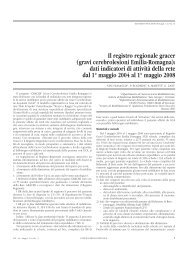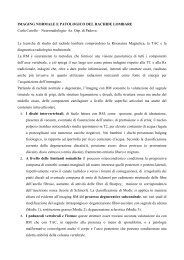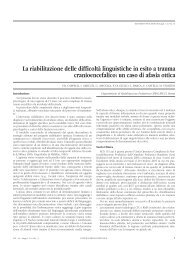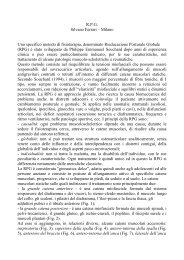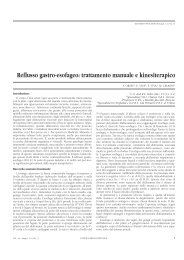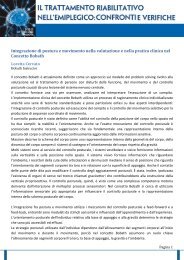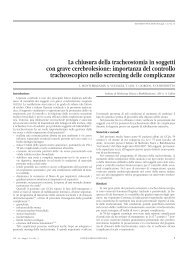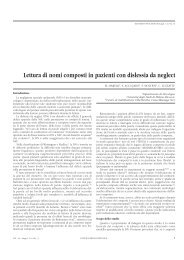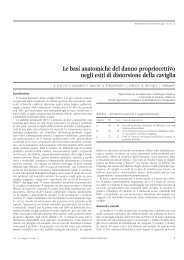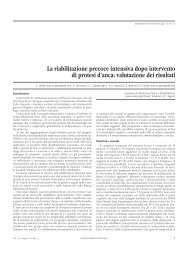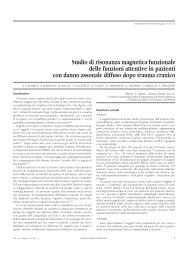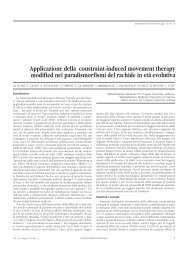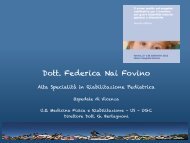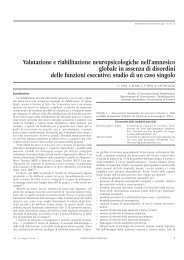Predizione dell'outcome e della destinazione dopo lo stroke ... - MediK
Predizione dell'outcome e della destinazione dopo lo stroke ... - MediK
Predizione dell'outcome e della destinazione dopo lo stroke ... - MediK
Create successful ePaper yourself
Turn your PDF publications into a flip-book with our unique Google optimized e-Paper software.
MAUGERI PREDIZIONE DELL’OUTCOME E DELLA DESTINAZIONE DELL’EMIPLEGICO CON AFASIA<br />
me funzionale; altri (Pedersen, Taub), invece, hanno evidenziato che<br />
l’afasia è un debole predittore indipendente di outcome. Il nostro<br />
studio ha trovato che l’afasia non è predittore di outcome. A differenza<br />
degli studi citati, il nostro è uno studio specifico sull’afasia,<br />
che analizza tutte le funzioni del linguaggio e tutte quelle variabili<br />
che in studi precedenti sono risultate realmente predittive.<br />
Bibliografia<br />
Pedersen PM, Jorgensen HS, Nakayama H, Raaschou HO, Olsen TS. Aphasia<br />
in acute <strong>stroke</strong>: incidence, determinants, and recovery. Ann Neurol.<br />
1995;38:659-66.<br />
Paolucci S, Antonucci G, Gial<strong>lo</strong>reti LE, Traballesi M, Lubich S, Pratesi L,<br />
Pa<strong>lo</strong>mbi L. Predicting <strong>stroke</strong> inpatient rehabilitation outcome: the prominent<br />
role of neuropsycho<strong>lo</strong>gical disorders. Eur neurol 1996;6:385-90.<br />
Fang Y, Chen X, Li H, Lin J, Huang R, Zeng J. A study on additional early<br />
physiotherapy after <strong>stroke</strong> and factors affecting functional recovery. Clin<br />
Rehabil 2003;17:608-17.<br />
Wade DT, Hewer RL, David RM, Enderby PM. Aphasia after <strong>stroke</strong>: natural<br />
history and associated deficits. J Neurol Neurosurg Psychiatry. 1986;<br />
49:11-6.<br />
Kwa V. I.H, Limburg M, de Haan R. The role of cognitive impairment in the<br />
quality of live after ischaemic <strong>stroke</strong>. J. Neurol 1996;243:599-604.<br />
Taub NA, Wolfe CD, Richardson E, Burney PG. Predicting the disability of<br />
first-time <strong>stroke</strong> sufferers at 1 year. 12-month fol<strong>lo</strong>w-up of a populationbased<br />
cohort in southeast England. Stroke. 1994;25:352-7.<br />
Pedersen PM, Jorgensen HS, Nakayama H, Raaschou HO, Olsen TS. The<br />
impact of aphasia on ADL and social activities after stoke: the Copenhagen<br />
<strong>stroke</strong> study. J. Neuro Rehab 1996;10:91-9.<br />
Giaquinto S, Buzzelli S, Di Francesco L, Lottarini A, Montenero P, Tonin P,<br />
Nolfe G. On the prognosis of outcome after <strong>stroke</strong>. Acta Neurol Scand<br />
1999;100:202-8.<br />
Carod-Artal F.J, Medeiros M.S.M., Horan T.A, Braga L.W. Predictive factors of<br />
functional gain in <strong>lo</strong>ng-term <strong>stroke</strong> survivors admitted to rehabilitation<br />
programme. Brain Injury, 2005;19:667-73.<br />
2 EUROPA MEDICOPHYSICA October 2008



